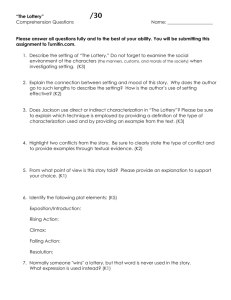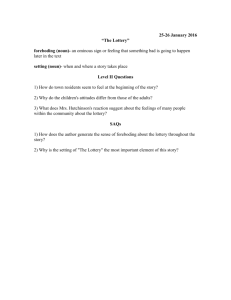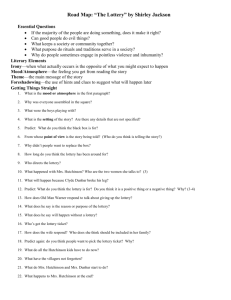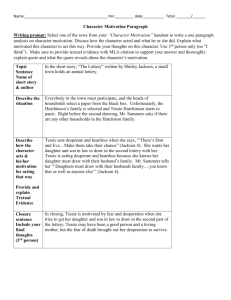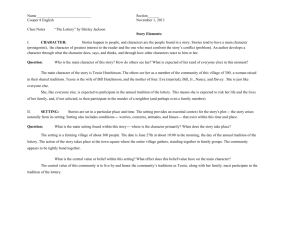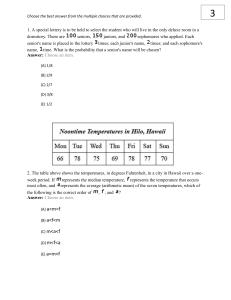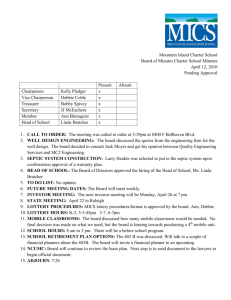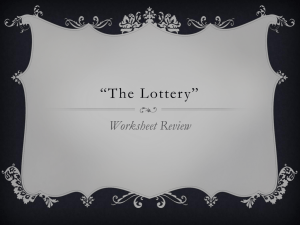The Lottery ANSWERS.doc
advertisement
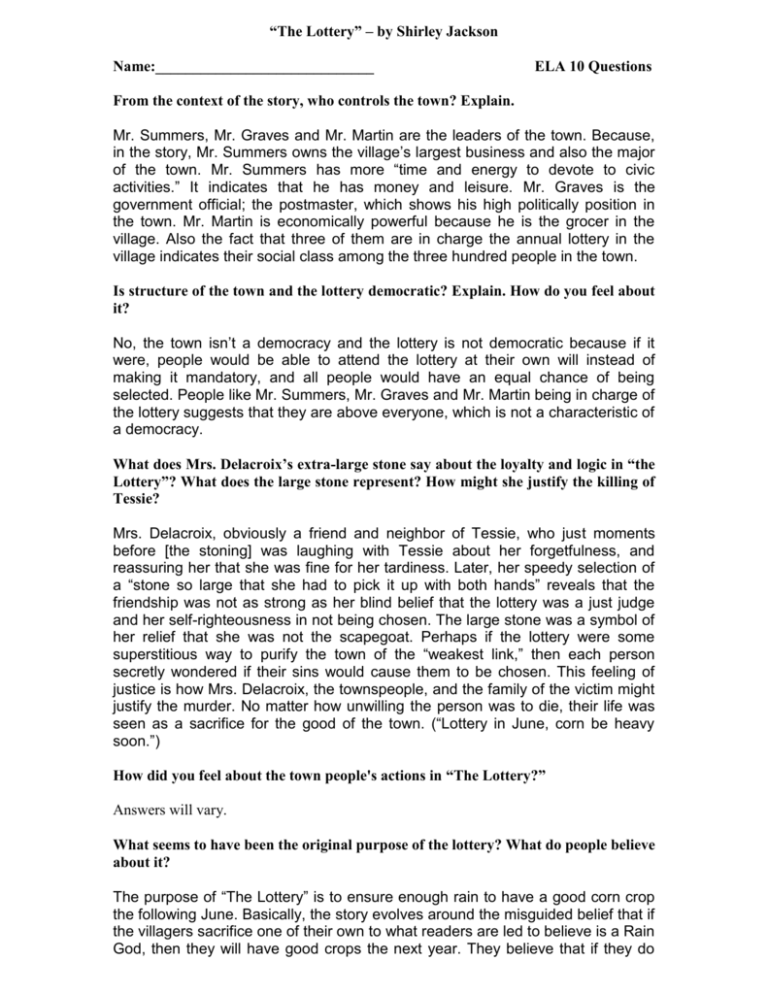
“The Lottery” – by Shirley Jackson Name:_____________________________ ELA 10 Questions From the context of the story, who controls the town? Explain. Mr. Summers, Mr. Graves and Mr. Martin are the leaders of the town. Because, in the story, Mr. Summers owns the village’s largest business and also the major of the town. Mr. Summers has more “time and energy to devote to civic activities.” It indicates that he has money and leisure. Mr. Graves is the government official; the postmaster, which shows his high politically position in the town. Mr. Martin is economically powerful because he is the grocer in the village. Also the fact that three of them are in charge the annual lottery in the village indicates their social class among the three hundred people in the town. Is structure of the town and the lottery democratic? Explain. How do you feel about it? No, the town isn’t a democracy and the lottery is not democratic because if it were, people would be able to attend the lottery at their own will instead of making it mandatory, and all people would have an equal chance of being selected. People like Mr. Summers, Mr. Graves and Mr. Martin being in charge of the lottery suggests that they are above everyone, which is not a characteristic of a democracy. What does Mrs. Delacroix’s extra-large stone say about the loyalty and logic in “the Lottery”? What does the large stone represent? How might she justify the killing of Tessie? Mrs. Delacroix, obviously a friend and neighbor of Tessie, who just moments before [the stoning] was laughing with Tessie about her forgetfulness, and reassuring her that she was fine for her tardiness. Later, her speedy selection of a “stone so large that she had to pick it up with both hands” reveals that the friendship was not as strong as her blind belief that the lottery was a just judge and her self-righteousness in not being chosen. The large stone was a symbol of her relief that she was not the scapegoat. Perhaps if the lottery were some superstitious way to purify the town of the “weakest link,” then each person secretly wondered if their sins would cause them to be chosen. This feeling of justice is how Mrs. Delacroix, the townspeople, and the family of the victim might justify the murder. No matter how unwilling the person was to die, their life was seen as a sacrifice for the good of the town. (“Lottery in June, corn be heavy soon.”) How did you feel about the town people's actions in “The Lottery?” Answers will vary. What seems to have been the original purpose of the lottery? What do people believe about it? The purpose of “The Lottery” is to ensure enough rain to have a good corn crop the following June. Basically, the story evolves around the misguided belief that if the villagers sacrifice one of their own to what readers are led to believe is a Rain God, then they will have good crops the next year. They believe that if they do not do this, then they will regress to hard times. The town patriarch Old Man Warner sums this up: "Pack of crazy fools, listening to young folks, northing's good enough for them. Next thing you know, they'll be wanting to go back to living in caves, nobody work anymore, live that way for awhile. Used to be a saying about 'Lottery in June, corn be heavy soon.' First thing you know, we'd all be eating stewed chickweed and acorns. There's always been a lottery." Is it important that the original paraphernalia for the lottery had been lost? What do you suppose the original ceremony was like? Why have some of the villages given up this practice? Why hasn't this one? Yes it is important that the original black box has been lost. The community continues the tradition of having the lottery every year. Some question it, however, when Mr. Summers mentions making a new black box, everyone argues this statement because that would be going against tradition. I would suppose that the original ceremony was very similar to the current one, as the community seems sticklers on the ritual. Some villages have given up this practice because they have concluded that it is not necessary to hold this ritualistic event anymore. It is violent, gruesome, and simply not needed. This village’s lottery continues because people are scared to go against the “traditionalists” of the community. What is the significance of Tessie's final scream, "It isn't fair, it isn't right"? What aspect of the lottery does she explicitly challenge; what aspect goes unquestioned? Tessie’s final scream signifies her view of the injustice of the lottery. She does not want to die! It is tradition, and the community appears to support it, hence her reason for being present, however, she only becomes outraged when it is her family selected. How many hints of the seriousness of the occasion can you find in the early parts of the story? (for this question, underline in your story places where foreshadowing occurs). From which characters do you get the best indication of what is to follow? See class PowerPoint notes. “The Lottery” – by Shirley Jackson Name:_____________________________ ELA 10 Enriched What is one of the themes of “The Lottery”? How does it relate to you? One of the themes of “The Lottery” is hypocrisy. This is seen in the story when just moments before the lottery, Mrs. Delacroix is joking with Mrs. Hutchinson about how late she is. However, when Mrs. Hutchinson is selected to be stoned, Mrs. Delacroix forgets her friendship and selects a stone so large that she has to pick it up with both hands. She even urges the others to “Come on and hurry up.” Mrs. Delacroix seems to be a close friend of Mrs. Hutchinson at the beginning but we see her true evil nature when she is eager to stone Mrs. Hutchinson relieved that it was not she herself that was chosen. Mrs. Hutchinson also expresses hypocrisy when she rushes her husband by saying, “Get up their Bill.” However, when they are the ones that have the unlucky slip of paper, she insists, “It wasn’t fair. You didn’t give him enough time to choose.” First Mrs. Hutchinson is eager to follow the yearly tradition of the lottery. However, when her husband first has the slip of paper she insists it must be a mistake. She suddenly hates the tradition once she is made the victim. Other themes: investigating the dark side of human nature, the danger of ritualized behavior, and the potential for cruelty when the individual submits to the mass will. How were women viewed in the village? What roles did they serve? Give examples from the text to support your answer. From the text, it can be inferred that women were viewed, by the men and by themselves, as the subordinate class in the village. There are several lines in the text that support this by implying that the woman’s place was the home, and the woman’s place was behind her man. Their occupation was implied in the fact that they were “wearing faded house dresses and sweaters,” suggesting that their place was in the home. Also, Tessie Hutchinson arrival with the excuse of the dirty dishes in her sink explains the townspeople’s opinion of the acceptable and expected activity for a woman in the village. It is also apparent that women were seen as less than men when the women “came shortly after their men folk.” A woman’s role in the lottery further supports this claim; drawings were performed by the “heads of families”, and a woman’s child, provided that he is of age, would draw before she could if her husband were not present. This clearly illustrates that they were seen as less valuable than the men. How does Shirley Jackson trivialize the grave practice of the community’s traditional stoning, and what message might Jackson be trying to convey to the reader through the treatment of the characters’ behavior? How do you feel about this? Jackson trivializes the grave practice of the community’s traditional stoning by showing her characters as being calm, natural, and unphased by the event. She also shows this by the conversations amongst her characters being ordinary. When Tessie contests her stoning, Mrs. Delacroix yells out, “Be a good sport, Tessie!” This statement trivializes the event. Jackson may be trying to convey the senseless traditions that people follow, also how dangerous the mob mentality can be. How is the choice of the lottery foreshadowed? If work ethic and the lottery choice are linked together, the choice of Tessie Hutchinson is foreshadowed. Tessie’s late arrival to the lottery displayed her absent-mindedness and the reaction of the town proved that she was looked down upon and thought more as a joke of the town. Tessie’s character did not fit the mold of the town thought a woman should be. Her late arrival and her outspokenness separated her from the rest of the women, foreshadowing her as the lottery’s choice. How does Shirley Jackson’s choice to withhold the ultimate purpose of this tradition until the end of the story prove to be an effective way to communicate with her readers? How did you feel at the end as a result of not knowing? Her withholding information not only enhances the suspense of the story, but it also proves to be a means of shocking her readers. The more Jackson involves her readers in the story and they begin to realize the ludicrousness of the situation at hand, the more she wins them over with the quintessence of her message to demonstrate that individuals are only free as long as they exercise their own rights to act and think independently of societal demands. How do the commonplace details of life and the folksy language contribute to the impact of the story? Why had Jackson chosen common people for her characters? Could she have chosen characters from other levels of sophistication with the same effect? What is the irony of the trite dialogue and casual tone of this story? The commonplace details lead the reader to think that this event could take place ANYWHERE….and that Tessie could be anyone. Its shocking to think that this could be your village. I do not believe the same impact would have taken place if the characters were more sophisticated. And, the story would probably be a little less believable if their education/class was elevated. People with more education/class would not allow this event to continue, regardless of tradition. Irony: The audience first thinks a lottery is a good thing. We read about the sunny, June 27th day, the children playing and excited that school has ended, as well as the townspeople making pleasant small talk. The reader does not expect the ending to conclude in such a horrific manner. Is the lottery a collective act of murder? Is it morally justified? Is tradition sufficient justification for such actions? How would you respond to cultures that are different from ours that perform "strange" rituals? Answers will vary.
